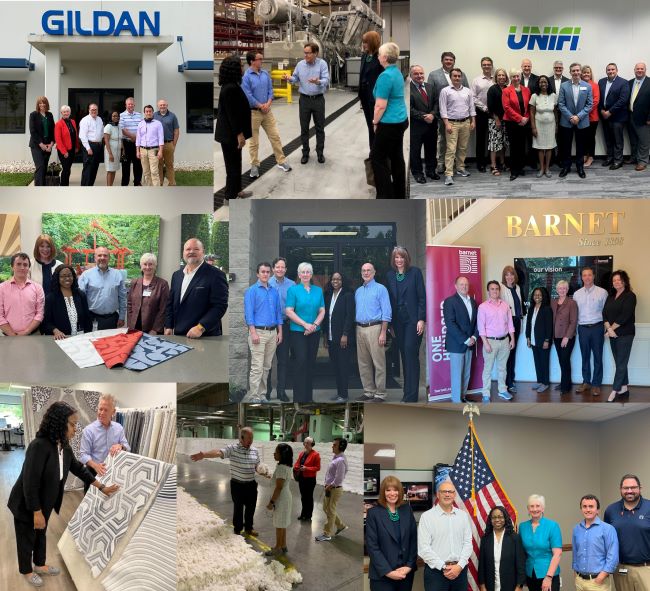Main Takeaways from Key Textile Trade Negotiator’s Visit to the Carolinas and the Heart of the American Textile Industry
Dr. Laurie-Ann Agama, Acting Assistant U.S. Trade Representative for Textiles, who toured seven NCTO member companies’ state-of-the-art manufacturing facilities earlier this month, said she came away from the meetings with “a better and deeper understanding of the challenges and opportunities U.S. manufacturers face in trade.”
Dr. Agama, who was accompanied by a U.S. textile trade team, experienced firsthand the industry’s innovation, resilience, and breadth of products in visits at the following NCTO member companies: Glen Raven, Parkdale Mills, Unifi, Gildan, Barnet, Standard Textile and Beverly Knits.
“We learned a lot about the trade issues affecting the textile industry and I come away from this trip with a better and deeper understanding of the challenges and opportunities U.S. manufacturers face in trade – I have a number of specific case studies and stories to share which clearly illustrate how trade and commerce affect people and communities in the United States,” Dr. Agama said in an email to NCTO staff.
Her visit comes at a pivotal time for the U.S. textile industry, which produced $65.8 billion in output in 2022 and employed 538,000 workers. The broader textile supply chain in the U.S. is a critical manufacturing segment contributing to job growth, investments, and innovation. From 2012-2021, capital investment in U.S. yarn, fabric and apparel and sewn products manufacturing totals $20.9 billion.
In addition, U.S. textile companies have been strong partners with the administration’s “Call to Action” for Central America to address the root causes of outward migration, spurring $2 billion in textile and apparel investments in the region in the past 18 months and bolstering a vibrant co-production chain that supports more than 1 million workers in the U.S. and the region.
Washington policies matter now more than ever, particularly this year, in which the industry has seen weakening orders due to economic headwinds, a continuing glut of inventory at retail, and a production slowdown, which taken together, are creating a more challenging business environment for the industry. That is why an industry roundtable with industry executives at the end of Dr. Agama’s three-day tour hosted by Unifi in Greensboro, N.C. was imperative.
U.S. textile executives spanning the fiber, yarn, fabric, and finished product textile and apparel industries participated in the roundtable and outlined critical policies, such as: the importance of maintaining the yarn forward rule of origin in the Dominican Republic-Central America Free Trade Agreement (CAFTA-DR) and other trade agreements; advancing the Miscellaneous Tariff Bill (MTB) and its importance to domestic manufacturers; closing the de minimis loophole in U.S. trade law; addressing larger systemic trade issues, particularly the use of forced labor, with China; and upholding buy American and Berry Amendment government procurement policies.
“We gathered a lot of technical information and saw first-hand the innovation, automation, and investments that have been made to improve U.S. competitiveness and gathered insights on how trade and U.S. trade policy affect and could support the industry and their business decisions to increase jobs in the United States and Central America and could facilitate increased production and exports,” Dr. Agama said. “This tour further strengthened our already strong relationships and partnerships.”
NCTO President and CEO Kim Glas, who toured the facilities and participated in the industry roundtable, lauded the visit by Dr. Agama and the USTR textile team, noting “the substantive discussions provided critical insight into the importance of the U.S. textile industry to local economies and the overall U.S. economy, while giving textile executives an opportunity to demonstrate their innovative prowess and explain how Washington policies translate into everyday impact on their business operations.”
“We look forward to working closely with Dr. Agama, the USTR textile team, and U.S. Trade Representative Ambassador Katherine Tai to advance policies that incentivize domestic and regional manufacturing, while enforcing legislation that addresses illegal trade practices, such as forced labor and transshipments, that undermine this industry,” Glas said.
Dr. Agama concluded, “I look forward to continuing to work with you [NCTO and the industry] to increase U.S. textile trade, support industry’s efforts to create new jobs, provide good wages and benefits to their workers, and commitments to generate overall positive impacts in surrounding communities, especially in rural areas similar to those we visited and passed through in N.C. and S.C.”
###

